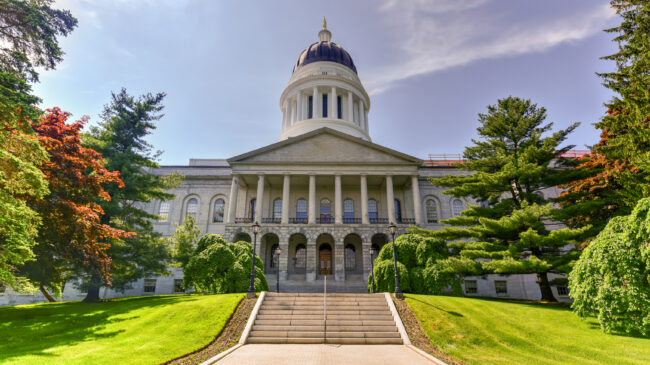This month marks the one-year anniversary of Massachusetts’ experiment in banning all flavored tobacco products. The Bay State was the first in the nation to enact such a far-reaching prohibition. Now, Maine is considering a similar ban on flavored tobacco products. But before moving forward, it should look at the data coming out of Massachusetts.
Before the Massachusetts bill prohibiting flavored tobacco passed in 2020, its supporters claimed that concerns over tobacco sales fleeing to other states were overblown and they said the expected public health benefits of the ban would offset any potential tax revenue losses. But, with eleven months worth of excise tax stamps, it appears they were wrong.
As Jonathan Shaerm, executive director of the New England Convenience Store and Energy Marketers Association, noted, Massachusetts lost $140 million in revenue from the ban on menthol cigarettes alone. Shaerm wrote:
The Massachusetts ban on the sale of flavored tobacco is a failed policy. The state has lost more than $140 million on menthol cigarettes alone, the regulated and enforced network of licensed retailers has been abandoned, and public health cannot claim a modicum of benefit. A failure by every measure.
Adding lost sales from flavored e-cigarettes, cigars, and oral tobacco makes the actual figure even higher than $140 million. The biggest beneficiaries of prohibition have been the state coffers of nearby Rhode Island and New Hampshire. Rather than actually reducing tobacco sales, it turns out that 88 percent of Massachusetts’ lost tobacco sales were made up for by increased sales in Rhode Island and New Hampshire last year. With flavored tobacco sales shifting to those states, New Hampshire gained $44 million in additional revenue and Rhode Island’s revenues increased $25 million thanks to tobacco users seeking products that are now banned across state lines in Massachusetts.
Given the massive displacement in cigarette sales, it’s reasonable to assume that cigarette consumption in Massachusetts has been robust despite the prohibition of flavored products. Thus, it appears Massachusetts lost significant tax revenue without reducing tobacco consumption as much as it had hoped. Consequently, those public health gains that were allegedly going to offset the financial costs of the ban are proving illusory.
Nevertheless, Maine could soon replicate the experience of Massachusetts. Maine House Bill 1550, currently before the Joint Health and Human Services Committee, would ban all flavored tobacco in the state.
These flavor bans are typically pushed by advocates claiming that flavors, in both cigarettes and e-cigarettes, disproportionately appeal to kids. But, according to the Centers for Disease Control and Prevention (CDC), most kids who smoke don’t smoke menthols. And when asked why they use e-cigarettes, a survey of youth vapers found that 75 percent of young people cited reasons other than flavors, with the main driver being “curiosity.”
There’s are other important reasons to be concerned that flavor bans have further unintended—and negative—consequences. A recent study published in JAMA Pediatrics, a peer-reviewed journal published by the American Medical Association, found, “San Francisco’s ban on flavored tobacco product sales was associated with increased smoking among minor high school students relative to other school districts.”
In fact, “San Francisco’s flavor ban was associated with more than doubled odds of recent smoking among underage high school students relative to concurrent changes in other districts,” the study concluded.
The report went on to warn that the ban could be worsening the city’s public health because it “may motivate youths who would otherwise vape to substitute smoking,” which is more harmful to their health:
“While neither smoking cigarettes nor vaping nicotine are safe per se, the bulk of current evidence indicates substantially greater harms from smoking, which is responsible for nearly one in five adult deaths annually. Even if it is well-intentioned, a law that increases youth smoking could pose a threat to public health.”
Maine has enjoyed enormous success in driving down smoking rates, particularly among youth. Youth vaping nationally fell dramatically in 2020 before the COVID-19 pandemic, lockdowns, and school closures. These successes were achieved in the absence of prohibition. Nevertheless, any youth tobacco use is a pressing concern, which is why the Food and Drug Administration (FDA) says it is pursuing a rule to ascertain whether it will ban menthol cigarettes. The FDA is also reviewing whether the benefits of e-cigarettes in terms of switching adults to a safer nicotine alternative outweigh the potential risk that some youth may use these products. The FDA is expected to start handing down decisions on e-cigarette product applications in September.
If the FDA approves these e-cigarette applications, it will do so because e-cigarette products will have been deemed “appropriate for the protection of public health,” particularly compared to smoking traditional cigarettes.
Preempting federal actions on tobacco flavors would leave Maine vulnerable to the kinds of unintended consequences seen in Massachusetts and San Francisco.
One of the virtues of federalism is that states can learn from each other’s successes and failures. Massachusetts’ experiment with banning flavored tobacco is suffering from the familiar pattern of failed prohibition efforts, seen previously on bans on alcohol and gambling. Maine has the chance to learn from—and avoid—the self-created problems that ill-advised flavored tobacco bans are causing in Massachusetts and San Francisco.

